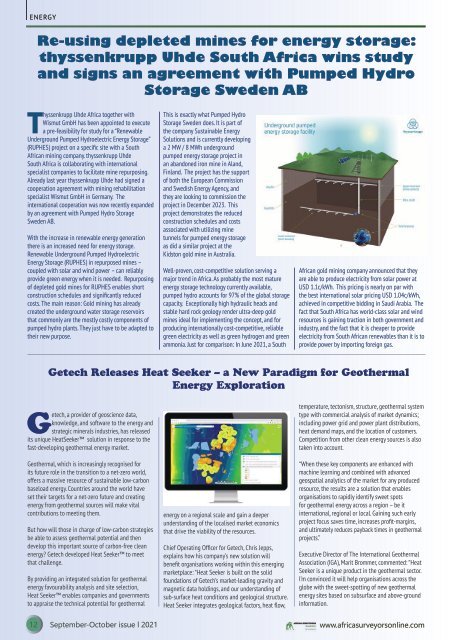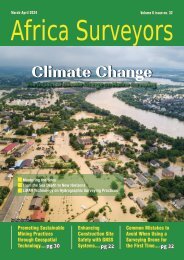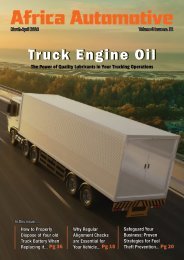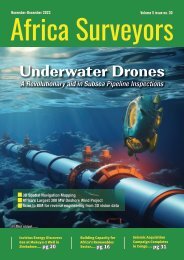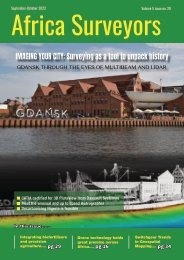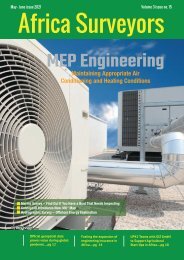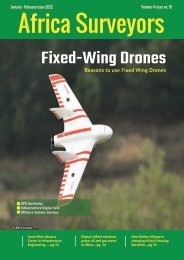Africa Surveyors September- October Digital issue 2021
Africa Surveyors is Africa’s premier source of Surveying, Mapping and Geospatial news and an envoy of surveying products/service for the Construction, Maritime, Onshore & Offshore energy and exploration, Engineering, Oil and Gas, Agricultural and Mining sectors on new solution based trends and technology for the African market.
Africa Surveyors is Africa’s premier source of Surveying, Mapping and Geospatial news and an envoy of surveying products/service for the Construction, Maritime, Onshore & Offshore energy and exploration, Engineering, Oil and Gas, Agricultural and Mining sectors on new solution based trends and technology for the African market.
Create successful ePaper yourself
Turn your PDF publications into a flip-book with our unique Google optimized e-Paper software.
ENERGY<br />
Re-using depleted mines for energy storage:<br />
thyssenkrupp Uhde South <strong>Africa</strong> wins study<br />
and signs an agreement with Pumped Hydro<br />
Storage Sweden AB<br />
Thyssenkrupp Uhde <strong>Africa</strong> together with<br />
Wismut GmbH has been appointed to execute<br />
a pre-feasibility for study for a “Renewable<br />
Underground Pumped Hydroelectric Energy Storage”<br />
(RUPHES) project on a specific site with a South<br />
<strong>Africa</strong>n mining company. thyssenkrupp Uhde<br />
South <strong>Africa</strong> is collaborating with international<br />
specialist companies to facilitate mine repurposing.<br />
Already last year thyssenkrupp Uhde had signed a<br />
cooperation agreement with mining rehabilitation<br />
specialist Wismut GmbH in Germany. The<br />
international cooperation was now recently expanded<br />
by an agreement with Pumped Hydro Storage<br />
Sweden AB.<br />
With the increase in renewable energy generation<br />
there is an increased need for energy storage.<br />
Renewable Underground Pumped Hydroelectric<br />
Energy Storage (RUPHES) in repurposed mines –<br />
coupled with solar and wind power – can reliably<br />
provide green energy when it is needed. Repurposing<br />
of depleted gold mines for RUPHES enables short<br />
construction schedules and significantly reduced<br />
costs. The main reason: Gold mining has already<br />
created the underground water storage reservoirs<br />
that commonly are the mostly costly components of<br />
pumped hydro plants. They just have to be adapted to<br />
their new purpose.<br />
This is exactly what Pumped Hydro<br />
Storage Sweden does. It is part of<br />
the company Sustainable Energy<br />
Solutions and is currently developing<br />
a 2 MW / 8 MWh underground<br />
pumped energy storage project in<br />
an abandoned iron mine in Aland,<br />
Finland. The project has the support<br />
of both the European Commission<br />
and Swedish Energy Agency, and<br />
they are looking to commission the<br />
project in December 2023. This<br />
project demonstrates the reduced<br />
construction schedules and costs<br />
associated with utilizing mine<br />
tunnels for pumped energy storage<br />
as did a similar project at the<br />
Kidston gold mine in Australia.<br />
Well-proven, cost-competitive solution serving a<br />
major trend in <strong>Africa</strong>. As probably the most mature<br />
energy storage technology currently available,<br />
pumped hydro accounts for 97% of the global storage<br />
capacity. Exceptionally high hydraulic heads and<br />
stable hard rock geology render ultra-deep gold<br />
mines ideal for implementing the concept, and for<br />
producing internationally cost-competitive, reliable<br />
green electricity as well as green hydrogen and green<br />
ammonia. Just for comparison: In June <strong>2021</strong>, a South<br />
<strong>Africa</strong>n gold mining company announced that they<br />
are able to produce electricity from solar power at<br />
USD 1.1c/kWh. This pricing is nearly on par with<br />
the best international solar pricing USD 1.04c/kWh,<br />
achieved in competitive bidding in Saudi Arabia. The<br />
fact that South <strong>Africa</strong> has world-class solar and wind<br />
resources is gaining traction in both government and<br />
industry, and the fact that it is cheaper to provide<br />
electricity from South <strong>Africa</strong>n renewables than it is to<br />
provide power by importing foreign gas.<br />
Getech Releases Heat Seeker – a New Paradigm for Geothermal<br />
Energy Exploration<br />
Getech, a provider of geoscience data,<br />
knowledge, and software to the energy and<br />
strategic minerals industries, has released<br />
its unique HeatSeeker solution in response to the<br />
fast-developing geothermal energy market.<br />
Geothermal, which is increasingly recognised for<br />
its future role in the transition to a net-zero world,<br />
offers a massive resource of sustainable low-carbon<br />
baseload energy. Countries around the world have<br />
set their targets for a net-zero future and creating<br />
energy from geothermal sources will make vital<br />
contributions to meeting them.<br />
But how will those in charge of low-carbon strategies<br />
be able to assess geothermal potential and then<br />
develop this important source of carbon-free clean<br />
energy? Getech developed Heat Seeker to meet<br />
that challenge.<br />
By providing an integrated solution for geothermal<br />
energy favourability analysis and site selection,<br />
Heat Seeker enables companies and governments<br />
to appraise the technical potential for geothermal<br />
energy on a regional scale and gain a deeper<br />
understanding of the localised market economics<br />
that drive the viability of the resources.<br />
Chief Operating Officer for Getech, Chris Jepps,<br />
explains how his company’s new solution will<br />
benefit organisations working within this emerging<br />
marketplace: “Heat Seeker is built on the solid<br />
foundations of Getech’s market-leading gravity and<br />
magnetic data holdings, and our understanding of<br />
sub-surface heat conditions and geological structure.<br />
Heat Seeker integrates geological factors, heat flow,<br />
temperature, tectonism, structure, geothermal system<br />
type with commercial analysis of market dynamics;<br />
including power grid and power plant distributions,<br />
heat demand maps, and the location of customers.<br />
Competition from other clean energy sources is also<br />
taken into account.<br />
“When these key components are enhanced with<br />
machine learning and combined with advanced<br />
geospatial analytics of the market for any produced<br />
resource, the results are a solution that enables<br />
organisations to rapidly identify sweet spots<br />
for geothermal energy across a region – be it<br />
international, regional or local. Gaining such early<br />
project focus saves time, increases profit-margins,<br />
and ultimately reduces payback times in geothermal<br />
projects.”<br />
Executive Director of The International Geothermal<br />
Association (IGA), Marit Brommer, commented: “Heat<br />
Seeker is a unique product in the geothermal sector.<br />
I’m convinced it will help organisations across the<br />
globe with the sweet-spotting of new geothermal<br />
energy sites based on subsurface and above-ground<br />
information.<br />
12 <strong>September</strong>-<strong>October</strong> <strong>issue</strong> l <strong>2021</strong> www.africasurveyorsonline.com


